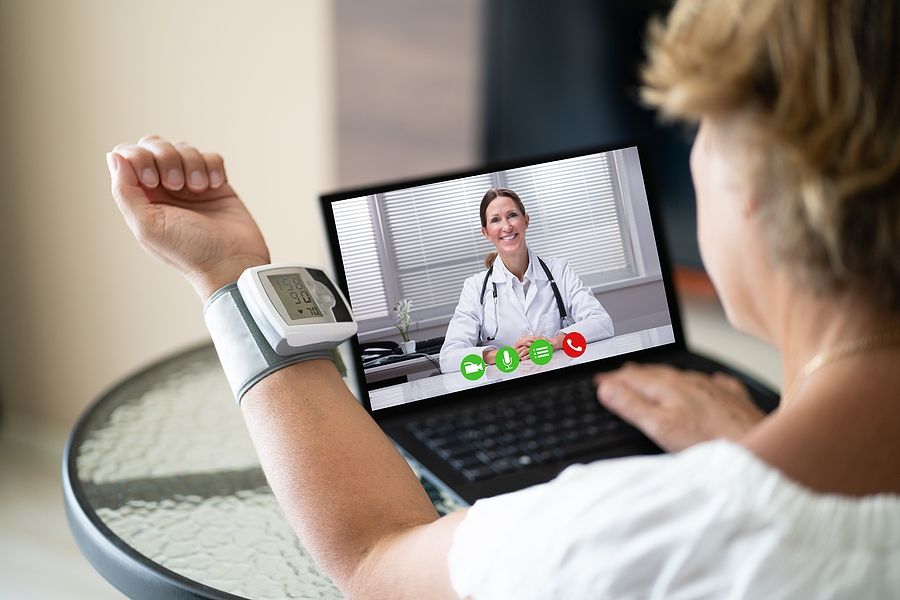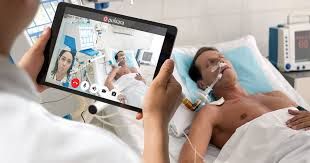
TeleHealth Hepatology
Liver Institute is proud to announce the launching of a nationwide Tele-Health Hepatology program led by Dr. Habib, a transplant hepatologist. We assembled a multidisciplinary team, including psychologists and nutrition services, to provide services remotely to complex liver disease patients, enhancing their care and helping them get through the transplantation and stay sober post-liver transplantation while simultaneously providing liver disease care.

What is a “TeleHealth Hepatology” practice?
TeleHealth (telemedicine) Hepatology is defined as the delivery of health care services at a distance using electronic means for diagnosis and treatment of chronic liver disease. The technology is cheap and easy to use.

Why do we need telemedicine in liver disease patients?
Presently, only about one-half of acute care hospitalizations for cirrhosis-related complications result in inpatient specialty care, and the current hepatology workforce cannot meet the demand of patients with liver disease nationwide, particularly in less densely populated areas and in community-based practices not affiliated with academic centers.

What are the limitations of telemedicine?
It is presently limited in scale by interstate licensing restrictions and reimbursement barriers.

Does telemedicine help sick liver disease patients?
Evidence strongly supports that access to specialty gastroenterology or hepatology care in cirrhosis is associated with higher adherence to guideline-recommended care and improves clinical outcomes.
Telemedicine has been used successfully for many years for hepatitis C therapy in incarcerated and rural populations.( 2 ) One of the most durable and scalable examples of telemedicine for liver disease has been for hepatitis C virus (HCV) treatment as part of the Extension for Community Healthcare Outcomes (ECHO), or Project ECHO, program.
Use of telehealth is associated with a substantial reduction in time from referral to initial evaluation by a hepatologist and placement on the liver transplant waitlist
In summary, telemedicine technology is low‐cost, widely available, and accepted by patients and providers. We launch telehepatology in which providing care to patients with complex advanced liver disease is feasible, acceptable, efficient, and does not compromise clinical care.

How do we provide care via telemedicine to our complex liver disease patients?
The remote care we provide to our patients is similar to what we do in person. Each session will last almost an hour utilizing this time to obtain history and lifestyle details, analyze the current status of the disease and gaps in the care, and focus on the treatment of all the manifestations of the liver disease such as ascites, encephalopathy, risk of gastrointestinal hemorrhage, cancer screening and above all management of alcohol use disorder if applicable. Nutrition is the key element of liver
disease treatment which is addressed in detail. Evaluation of the need and readiness for transplantation is also the most important factor in the management of advanced liver disease, which must be performed efficiently to avoid suffering and survival. In summary, we take a holistic approach to address liver disease with a goal of cure or at least remission with longevity and good quality of life.

How can you make an appointment?
Call us at 520-382-5072
Email us at helpdesk@liverinstitutepllc.org
Do we take insurance for Tele-Health visits?
No, we do not take any insurance for this visit, however, we provide an itemized receipt to help to submit a claim to your insurance for reimbursement, if applicable.
Please ask the schedule and support staff to guide you on the service fee.

What should you expect once you make an appointment?
Once an appointment is set, you will receive a few forms to fill, allowing us to take care of you, and also to obtain your record from PCP and other providers. We like to have all the prior test results including imaging, heart tests, lab tests, DEXA scans, and other records.
On the first visit, an intern will start the meeting to gather all the details of your illness, lifestyle, and other relevant information. Upon completion of the interns’ interview, Dr. Habib (transplant hepatologist) will join the conference and will review all the gathered information and explain in detail the status of the disease, prognosis, and treatment to recover. The whole first visit may take up to 90 minutes. Finally, a good time is spent answering your questions.
Finally, our team will execute the entire care plan and set you up for the recommended testing in your local area, which will be covered by your insurance.

· Johnson A, Habib S. Liver transplantation consideration and evaluation: a life-saving treatment in acute-onchronic liver failure. Explor Dig Dis. 2024;3:262–74. https://doi.org/10.37349/edd.2024.00051
· Serper M, Volk ML. Current and Future Applications of Telemedicine to Optimize the Delivery of Care in Chronic Liver Disease. Clin Gastroenterol Hepatol. 2018 Feb;16(2):157-161.e8. doi: 10.1016/j.cgh.2017.10.004. PMID: 29389489; PMCID: PMC6334286.
· 17. John BV, Love E, Dahman B, Kurbanova N, Konjeti VR, Sundaram LT, et al. Use of telehealth expedites evaluation and listing of patients referred for liver transplantation. Clin Gastroenterol Hepatol 2019. Dec 27. pii: S1542‐3565(19)31501‐0. 10.1016/j.cgh.2019.12.021. [Epub ahead of print] [DOI] [PMC free article] [PubMed] [Google Scholar]
· Konjeti VR, Heuman D, Bajaj JS, Gilles H, Fuchs M, Tarkington P, et al. Telehealth‐based evaluation identifies patients who are not candidates for liver transplantation. Clin Gastroenterol Hepatol 2019;17:207‐209.e1. [DOI] [PubMed] [Google Scholar]
· Arora S, Kalishman S, Thornton K, Dion D, Murata G, Deming P, et al. Expanding access to hepatitis C virus treatment—Extension for Community Healthcare Outcomes (ECHO) project: disruptive innovation in specialty care. Hepatology 2010;52:1124‐1133. [DOI] [PMC free article] [PubMed] [Google Scholar]
· Serper M, Cubell AW, Deleener ME, Casher TK, Rosenberg DJ, Whitebloom D, Rosin RM. Telemedicine in Liver Disease and Beyond: Can the COVID-19 Crisis Lead to Action? Hepatology. 2020 Aug;72(2):723-728. doi: 10.1002/hep.31276. PMID: 32275784; PMCID: PMC7262294.
